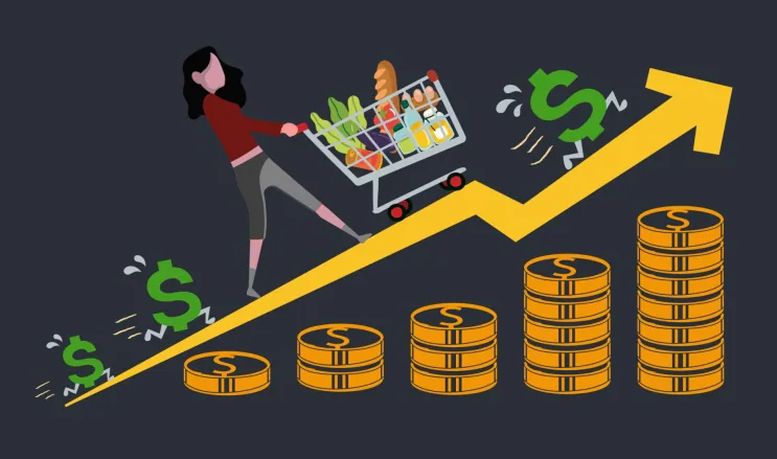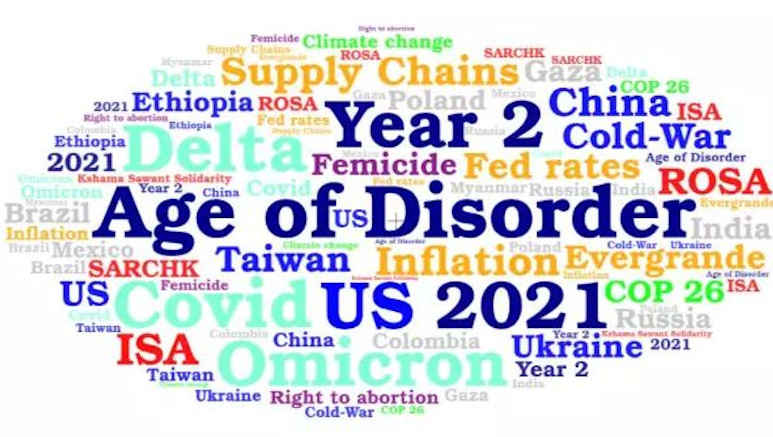Inflation is soaring and devastating workers’ living standards. Every trip to the food store brings a new shock. Canada’s official inflation rate was an 8.1 percent increase in June over May, the painfully worst increase in 40 years. To add to the pain, the Bank of Canada raised its prime interest rate from 1.5 percent to 2.5 percent, a 66 percent increase.
Economists are having raging debates about the cause, but what is absolutely clear is that wages are not causing inflation — in fact they never have. At best, workers’ wages keep pace with rising prices and that is not happening now. Real wages in Canada have largely stagnated for decades and in the last month while inflation was 8.1 percent, average wages increased just 5.2 percent. In 2021, yearly inflation was 4.8 percent, but average wages were up only 2.1 percent. Workers’ living standards are falling.
Although wages have not caused inflation, economists keep warning about a “wage-price spiral.” The head of the Bank of Canada, Macklem, urged companies to hold wages below the rate of inflation, clearly the Bank is on the side of Bay Street. The “wages cause inflation” argument is a myth to hide other real causes. It is much like modern economics: it is not a science but an ideology to justify policies that benefit the rich and big business. A key idea of neoliberalism was “trickle-down economics,” the claim that if the rich had big tax cuts the money would flow through society to everyone. There was never any evidence to back up this claim and all the evidence of the last 30 years is that wealth has flowed to the rich away from the working class. But the ideology of “trickle-down” served the rich very well.
It is clear a major contributor to this spike in prices is disruptions to supplies, whether due to COVID, war, climate disasters, lack of workers and more. Jacking up interest rates will have no effect on any of these. It will not end the war in Ukraine, it will not miraculously produce more workers or end the droughts and floods that are devastating agriculture.
The Bank of Canada is expected to put up interest rates again in September to 3.25 percent, with possibly more increases to follow. The Bank of England expects inflation there to be over 13 percent by the end of 2022, and for Britain to be in a recession for more than a year — a grim warning of what lies ahead.
Raising interest rates boosts inflation. While higher interest rates have resulted in a small fall in house prices across Canada, they are still far higher than at the start of COVID. The cost of buying a house is not just the price, it is the cost of the mortgage and jacking up interest rates has made mortgages, and therefore buying a house more expensive.
The higher interest rates, and other factors such as speculative purchases, is pushing up rents. Affordable housing is defined as rent and utilities costing no more than 30 percent of income. To rent a two-bedroom apartment in Vancouver, with an average rent of $3,597 a month, would require a before-tax annual income of $150,000. In Toronto it is $130,000. Even in less expensive cities, such as Halifax, the rent requires an annual income of $65,000.
Why Put Up Interest Rates?
While raising interest rates will not improve supplies, it can slow demand and eventually provoke a recession. This was how capitalism dealt with inflation in the late 1970s. The US Federal Reserve bank, under its Chair Paul Volker, pushed the main lending rate (called “prime rate”) to 21.5 percent in 1981. Official unemployment in the US soared to over 10 percent, with many more workers without a job but not officially unemployed. A similar pattern was repeated in Canada and many other countries.
For many neocolonial countries the debts repayments, due to the high interest rates, became unaffordable. Sixteen Latin American countries had to reschedule their debts. The IMF and other capitalist organizations imposed “structural adjustment programs,” fancy words for slashing public services, causing soaring unemployment, falling living standards and a deep economic recession. The 1980s is called the “lost decade” in Latin America.
Bankers, economists and politicians talk about a “soft landing,” which brings to mind the economy gently laying down on a nice pillow. The Bank of Canada has never delivered a soft landing. The phrase is a disguise for the real motive of higher interest rates: cut demand for goods, further cut wages and provoke a recession.
Government Inaction
The Canadian government claims it is up to the Bank of Canada to deal with inflation and there is nothing it can do. This is another economic myth. There are several obvious actions it can do to reduce inflation and reduce the hit on workers’ living standards.
As supply chains and bottlenecks are part of the problem it could act to tackle these. One issue is the so-called shortage of workers — this is more a shortage of pay in some sectors, so workers are moving to better paid jobs. The government could act to raise low wages and also provide training to deal with skill shortages. A glaring area is an estimated shortage of 23,000 truck drivers that is expected to increase to 55,000 by 2024. The “convoy” never addressed the real issues of trucker drivers — lack of training and safety, long hours, widespread wage theft, lack of rest areas and services on the road, etc. Improving the quality of truckers’ work is an obvious place for action to improve deliveries. This example of a practical solution to a supply chain issue, and the government’s inaction, demonstrates the root problem. Increasing the number of drivers and improving their pay and conditions would cost more in wages, training, etc. and therefore hit company profits. The government is more dedicated to protecting profits than helping workers or customers. Of course, a fighting truckers’ union would be a bigger help.
It is clear that some companies are profit gouging, hiding behind inflation. A big driver of inflation is the increased cost of gas and oil. Yet there has been no increase in the cost of producing oil and gas in Canada. The oil companies are raking in mega-profits.
In the first three months of 2022 the major Canadian oil companies had record profits. Canadian Natural Resources’ profit was $3.1 billion, more than double a year ago. Suncor made $2.95 billion, nearly four times the same period in 2021. Cenovus had its biggest ever first-quarter profits at $1.6 billion. Imperial Oil’s profit was $1.17 billion, the best first quarter in 30 years. A real gravy train for shareholders and the bosses paid for by the misery of oil users – drivers, truckers, farmers and many others.
Suspend Sales Tax
Across Canada there are taxes on the sales of many goods. These taxes (GST, HST and PST) are deeply unfair, hitting low-income people harder than the rich. A progressive income tax is much fairer as the rich pay at a higher rate than low- and middle-income working people.
If the sales tax was suspended it would cut the cost of many vital goods and services for all workers. It would hit government revenue, but the gap could be made up, not by cutting services but by imposing a super tax on the mega-rich, whose wealth soared during COVID, and the soaring profits of many companies.
Increasing taxes on the big corporations and the super-rich would also withdraw at least some of the trillions of dollars that governments and central banks injected into the economy in the last two years, on top of the trillion added in 2008-09. This money sloshes around in asset bubbles and speculation, adding to economic instability, and, at least according to some economists, also boosts inflation.
On top of the profit-gouging oil companies, the banks and telecoms are raking in money. Canada’s five big banks had profits of $57.4 billion in 2021. Just days before the Rogers’ network collapsed, the company announced record profits. In the first three months of 2022 it collected profits of $409 million, up 35 percent from last year. Telus is also raking in the money for its shareholders. Its net income (profit) for the second quarter of 2022, at $498 million, was up 45 percent from a year ago. The repeated failures of the telecom companies in Canada demonstrates the need for a publicly-owned and democratically-run telecoms industry.
Three food-chain giants — Loblaws, Empire and Metro — have 75 percent of market share in Canada. They own many well-known brands including President’s Choice, No Name, Superstore, Sobeys, IGA, Safeway, Metro and others. A Toronto Star report backing up research by CCPA, found that they are taking advantage of inflation.
It is clear that some businesses are benefitting from inflation while working people are being hit hard. The federal and provincial governments could act to link all pensions and income supplements to the rate of inflation and update the payments every month. While pensions are linked to inflation – CPP is revised just once a year, and Old Age Security and Guaranteed Income supplement every three months — this is totally inadequate with soaring inflation. Provincial welfare rates are only linked to inflation in New Brunswick and Québec. Other provincial benefits — to children, seniors and sales tax relief — are only indexed in Québec, with a few provinces indexing one or another. This means the poorest in society will fall further behind as the rich get richer.
Governments could suspend sales taxes and compensate for the loss of income by taxing the super-rich and the super profits of some corporations. However, a Liberal government in the pockets of Bay Street will not do this. The Conservatives, in love with big oil, will not act either.
Unions, consumer groups and anti-poverty activists should demand the NDP fight with all their energy to get the federal government to index-link all benefits and suspend the federal sales tax, to be replaced by taxes on profit-gouging companies. The NDP has the power to scrap the supply agreement that props up the minority Liberal government. The living standards of working people are more important propping up the Liberals. The NDP in BC could scrap the 7 percent sales tax tomorrow and link welfare rates to inflation. These actions, federally and in BC, by the NDP would inspire workers across Canada and show that there is a reason to vote NDP. The action in BC and a successful federal campaign would put immense pressure on other provincial governments to follow suit. Unfortunately, the NDP is unlikely to take such a strong pro-worker path.
Unions Need to Act
Working people cannot rely on or wait for governments to act. Unions should fight for Cost-of-Living Adjustments (COLA). In all new contracts this needs to be a central issue to protect workers from the ravages of inflation. Unions should also push to reopen existing contracts signed at a time of little or no inflation to add COLA.
Looking ahead, these profit-gouging companies cannot even provide a reliable and affordable service, as Rogers has demonstrated. They should be brought into democratic public ownership so, instead of being run for profit for the few, they are run for the benefit of society.




